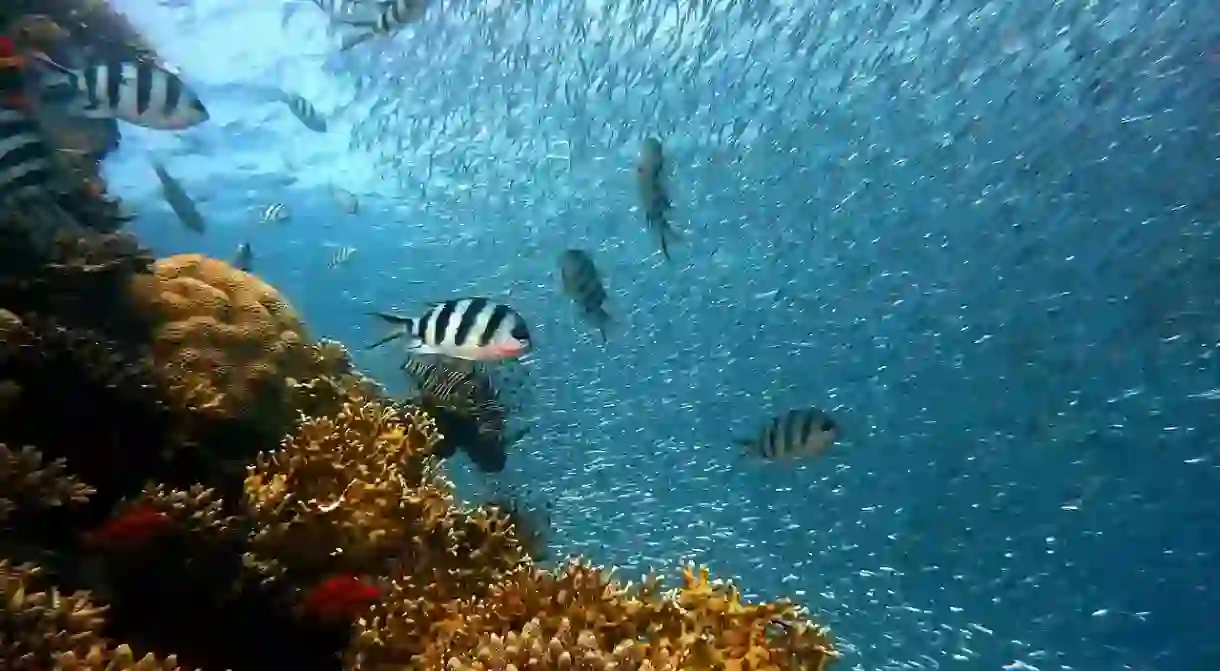The Best Watersports to Try in Fernando de Noronha, Brazil

Besides being a picturesque paradise and a marine-life sanctuary, Fernando de Noronha – a volcanic archipelago off the northeastern coast of Brazil – is a dream playground for those who love watersports. Whether its exploring sunken ship wrecks or catching a perfectly formed tube wave, Noronha provides perfect conditions for water-based activities. Here are some of the best watersports to try in Fernando de Noronha.
Diving
Of all the water sports in Fernando de Noronha, diving is number one and is the best place in Brazil to see a variety of marine life, including endemic species of fish as well as sharks, dolphins, turtles, and rays. Whether you are a beginner or an advanced diver, there are several diving spots around the island that will provide an unforgettable dive, no matter your level. For advanced divers, head to Corveta V 17 diving spot, 63 meters below the surface, to explore an old ship wreck and spot incredible marine life.
Surfing
The best time to surf at Fernando de Noronha is between December and March, unlike the rest of Brazil when the country’s winter months tend to offer better surfing conditions. The best beaches to surf at in Noronha are Biboca, Cachorro, Bode, Meio, Conceição, Boldro, and Cacimba do Padre, the latter considered one of the best on the island. The wave height tends to hover around two metres although some days have seen waves up to five meters high. Some national surf championships are held on the island which is a great way to watch and meet professional surfs from around the globe.
Bodyboarding
In addition to surfing, bodyboarding is a popular sport to try out in Fernando de Noronha. Like surfing, the best beach to bodyboard is Cacimba do Padre and the right season to go is between December and April. It’s best to bring your own bodyboard to use as it is hard to rent them out on the island.
Snorkeling
With water temperatures around 28 to 30 degrees Celsius and visibility reaching up to 40 meters, snorkeling can be just as satisfying for marine life watching as diving. The best months for snorkeling are between August and December when the water is calm and snorkeling equipment can easily be rented from kiosks near the beach or from your hotel. There are some incredible points to snorkel including Morro de Fora, Baia dos Porcos, Meio, and Conceição. Head to Porto to snorkel among two ship wrecks and see various species of marine animals.
Windsurfing
Windsurfing is popular in Fernando de Noronha, especially in Brazil’s autumn and winter months. If you decide to go to Fernando de Noronha to windsurf, it’s necessary to bring your own kit as renting windsurf equipment on the island will be hard. Sometimes, windsurfing events and competitions are held at Fernando de Noronha which is a great time to watch experienced windsurfers and meet people from the windsurfing community.
Planasub
If you haven’t heard of planasub before, then you are not alone – yet you probably will become familiar with this term after a trip to Fernando de Noronha. Planasub is an active type of water sport that is a cross between diving, water skiing, and snorkeling. How does it work? You hold onto a plastic board and are towed along by a boat, allowing you to observe the marine life underwater without having to swim. When you want to come up to breathe, you just tilt the angle of the board which will help you surface. The boat moves at a pleasant speed, enough to make you feel like you are floating, and tour operators usually take out groups of six to eight people at a time.
Free diving
The most typical form of diving in Fernando de Noronha is diving with equipment but some people prefer to free dive, or in other words, dive without any apparatus. Free divers can enjoy the same diving spots as regular divers, especially in the beginner or intermediate level diving areas. More advanced dives – such as 40 meters or deeper – require special attention as there can be strong underwater currents. Check with diving schools to find out the conditions of the water before you free dive.













